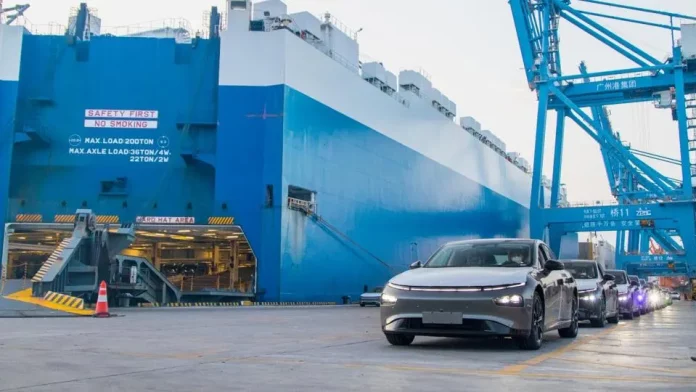China’s electric vehicle (EV) export industry is causing a surge in orders for car-carrying ships, with predictions suggesting that China could have the world’s fourth-largest fleet of such vessels by 2028.
Currently, China has the eighth-largest fleet, but companies like SAIC Motor, Chery Automobile, and BYD, along with shipping giants COSCO and China Merchants, are leading the charge by ordering 47 new vessels. This move is expected to increase China’s global car carrier fleet share from 2.4% to 8%. China is also opening up new trade routes specifically for Chinese automakers.
The surge in ship orders also highlights China’s increasing role as a significant player in the global automotive market. Additionally, China has surpassed Japan as the largest auto exporter, with BYD leading the way by exporting 8% of its total sales. This expansion is supported by competitive pricing, economic incentives, and an efficient manufacturing sector that has attracted foreign firms like Tesla and Volkswagen to produce and export vehicles from China.
As shipping costs continue to rise, automakers are increasingly investing in their own fleets, with charter rates for car carriers expected to increase more than sevenfold. However, China’s aggressive export strategy has sparked controversy, with the U.S. and EU accusing China of flooding the market and having industrial overcapacity. China counters these claims by emphasizing its focus on innovation and economic growth, stating that the shipbuilding industry, particularly in the car carrier segment, remains a niche with growth potential.
Meanwhile, foreign automakers entering Italy, including Chinese firms and Tesla, pose strategic challenges for domestic players like Stellantis. The potential increase in competition could lead to difficult decisions, including possible plant closures, despite Stellantis’ efforts to remain competitive. Carlos Tavares, Stellantis CEO, has expressed the company’s readiness to face competition, emphasizing its substantial presence in Italy and plans for electrification, including producing an electrified Fiat Panda.
The changing landscape of the industry in Italy, marked by foreign investments and a move towards electrification, reflects broader industry trends. Price competition is intensifying, exemplified by BYD’s price reductions, and there is an anticipated squeeze on profit margins. These dynamics underline the strategic shifts required for traditional automakers like Stellantis to navigate the changing market, driven by the global expansion of Chinese automakers and the increasing influence of EV technology.




